Sinclair stations democracy
April 26, 2018
Sinclair Broadcast Group, the largest U.S. telecommunications company, has recently come under fire for demonstrating its lack of regard for the journalistic process. Specifically, it has been revealed that Sinclair-owned media stations read off of identical scripts; ironically, the scripted message that triggered alarms was about fake news on social media. Subsequently, a flurry of media attention has brought this issue to the forefront of a continuing debate about the reliability and trustworthiness of traditional news sources.
The media has long acted as a check on the government’s use of power. This is predicated on an understanding that the information that the media provides to the public is truthful; unfortunately, recent actions by news stations owned by Sinclair Broadcast Group jeopardize this role. More than simply failing to act in their capacity to inform, these news stations actively threaten U.S. democracy, because if faith in media fails, it would become more difficult to check the potential excesses of the U.S. government.
“Fake news” has become a buzzword in the current political climate, one often cited in reference to several mainstream media sources, and thus confidence in their ability to accurately inform the public has decreased. Because public faith in the media must be increased over a relatively long period of time,events like this instance of unprofessionalism from Sinclair present yet another roadblock toward restoration of faith in the media, and further support the notion that mainstream media sources are out to misinform the American people.
It is crucial that faith in the media does not reach a critically low level, as the media serves important functions in democracy. Primarily, they inform the public from an outsider’s point of view; conflicts of interest prevent governments from being effective news sources. Should mainstream media lose the public’s trust, the general public would become less informed about issues, and thus, democracy would not function as well.
The media also checks excesses of power in government. For example, during the Nixon administration, the Washington Post unearthed the infamous Watergate scandal, revealing Nixon’s abuses of presidential power and alerting the public of corruption in the White House, resulting in Nixon’s resignation. Without the trust of the public, however, such checks on abuses of power become less effective, damaging the strength of our democracy.
Some measures should be taken to prevent similar occurrences in the future. The Federal Communications Commission (FCC) manages guidelines for television programming, including news broadcasting. Additionally, the FCC is obliged to regulate broadcasting services to act in the general public interest of society; this means that Sinclair acted against the purpose and ideal of the FCC’s regulations. While there is an argument to be had for protections afforded to the press by the First Amendment, the overall health of democracy should take precedence. Thus, closer regulation by the FCC of existing television news channels is in order.
Perhaps this event will prompt a closer adherence to journalistic norms in the future; however, with Sinclair declining to issue an apology, one can expect to see more of the same in the future.



































































